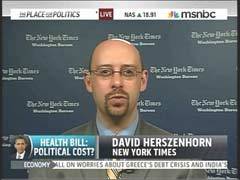'Free Housing' an Aspect of Soviet Union's 'Appealing' Past
Reporter David Herszenhorn announced from Moscow Wednesday that the time was seemingly ripe for a 'Communist comeback' in the confusingly headlined 'Where Communists See a Political Opening, Many Russians See a Closed Door.' Herszenhorn didn't mention the repression and terror of the Communist era.

If there was ever a moment for a Communist comeback, it would seem to be now.
The Communists were big winners in recent parliamentary elections, capturing nearly 20 percent of the popular vote and cementing their place as the most formidable opposition bloc, as voters began to express their exhaustion with United Russia, the governing party of Prime Minister Vladimir V. Putin.
Meantime, the world financial crisis, which has toppled governments and spawned social unrest in the euro zone, has provided reams of material for railing against the excesses and evils of capitalism - with warnings of 'debt bondage,' 'fictitious capital' and 'financial imperialism.'
But rather than starring in the Great Red Revival, the longtime party leader, Gennadi A. Zyuganov, has instead found himself walking a political high wire.
Herszenhorn noted that 'Russians, no matter how unhappy they are with the current government, seem to have concluded that life is better in a market economy.'
In appealing to young voters, Mr. Zyuganov, 67, may be his own biggest obstacle.
He very much looks the part of an old-school, bull-faced Communist Party boss. He was among the hard-liners in the Communist leadership who opposed Mikhail S. Gorbachev's reforms in the 1980s, became the party's first secretary in 1993 and ran unsuccessfully in presidential elections in 1996, 2000 and 2008.
The party's weaknesses were on full display this week, when the Communists held a rally near the Kremlin.
Although they had a permit for 10,000 participants, fewer than 3,000 turned out. Many who attended not only represented old-style Communism, but also were just plain old: hunched-over men in their 70s and 80s, handing out pamphlets with titles like 'Communist of Leningrad.'
Still, there were some young people who said they hoped for a Communist resurgence.
Herszenhorn referenced some of those young, who apparently missed the 'stronger education system, free housing' (without mentioning the education was state propaganda and that the housing came at the end of a decades-long waiting list) of the Soviet Union.
Leonid N. Dobrokhotov, an adviser to Mr. Zyuganov, said the Communists were positioned to gain support even before the elections incited public anger, because of United Russia's steadily declining popularity.
Mr. Dobrokhotov said that many aspects of the past - a stronger education system, free housing - now seemed appealing to young Russians. 'Maybe there were some problems in the Soviet Union, but it was a superpower and the people had a real foundation to be proud,' he said.
Herszenhorn spent months cheering on Obama-care as the issue's beat reporter for the Times.


